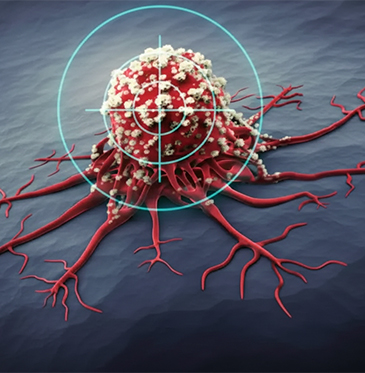
At the Bhagwan Mahaveer Cancer Hospital & Research Centre (BMCHRC), our Preventive Oncology represents the forefront of compassionate cancer care. We understand that a cancer diagnosis can be overwhelming, both physically and emotionally, which is why our dedicated team is committed to providing personalized and comprehensive care to every individual who walks through our doors.
Cancer remains one of the leading causes of mortality in India, with millions of cases diagnosed annually, resulting in significant morbidity and mortality. Acknowledging this challenge, BMCHRC's Preventive Oncology Services are committed to combating this disease through early detection and prevention strategies. With a focus on awareness and screening, our department aims to reduce the burden of cancer by promoting healthy lifestyle choices and facilitating early detection through regular screenings. We offer screening for the most prevalent cancers, including breast, cervical, and oral cancers, at highly subsidized rates in our OPD and through community-based camps, ensuring accessibility to all. Our comprehensive services encompass awareness programs, screening camps, tobacco cessation counseling, and general health packages. We observe special days such as World Cancer Day and National Cancer Awareness Day to further raise awareness and engage with the community. Additionally, we provide genetic-specific screening and tobacco cessation services to address individual risk factors and promote overall health and well-being. Our mission is to empower individuals with the knowledge and tools to prevent and detect cancer early, ultimately saving lives and improving community health.

BMCHRC's Preventive Oncology Services encompass a wide scope of initiatives aimed at reducing the incidence and impact of cancer within the community. From awareness programs and screening camps to tobacco cessation counseling and general health packages, our preventive services strive to promote early detection and healthy lifestyle habits, ultimately contributing to improved health outcomes and reduced cancer burden.

Through comprehensive awareness programs, BMCHRC educates the public about cancer risk factors, signs, and symptoms, while dispelling myths and misconceptions surrounding the disease. By raising awareness and promoting early detection practices, we empower individuals to take proactive steps towards cancer prevention and timely intervention.

Our screening camps extend access to cancer screening services to underserved populations, offering convenient and cost-effective screening opportunities outside of traditional healthcare settings. These camps provide essential screenings for common cancers, facilitating early detection and timely intervention for individuals who may not otherwise have access to healthcare services.

Our outpatient department (OPD) serves as a vital hub for preventive oncology services, offering consultations, screenings, and counseling to individuals seeking proactive cancer prevention and early detection. Patients receive personalized care and guidance from our dedicated healthcare professionals, fostering a supportive environment for preventive healthcare initiatives.

At BMCHRC, we offer comprehensive cancer screening services tailored to individual risk profiles and needs. Through regular screenings for breast, cervical, and oral cancers, we detect potential abnormalities early, enabling timely intervention and improving treatment outcomes for our patients.

Our general health packages provide individuals with comprehensive health assessments, including screenings for cancer risk factors and other chronic diseases. These packages offer a holistic approach to preventive healthcare, promoting overall well-being and early detection of health concerns.

Recognizing the significant role of tobacco use in cancer development, our tobacco cessation counseling services offer support and guidance to individuals seeking to quit smoking or using other tobacco products. Through personalized counseling sessions and tailored cessation plans, we empower individuals to overcome addiction and reduce their cancer risk.
.webp)
At BMCHRC, we understand the importance of accessibility and convenience when it comes to cancer screening. Our CJAD (Cancer Jaanch Apke Dwar) program brings cancer screening services directly to our patients through in-house services, eliminating barriers to early detection and ensuring timely intervention. With CJAD, individuals can undergo screenings for common cancers such as breast, cervical, and oral cancers within the familiar and comfortable setting of our hospital.
In order to diagnose cancer in its early stages, regular cancer screening camps are organized by cancer care not only in Rajasthan but also in nearby states as well. Cancer Care (Women's Wing) and Bhagwan Mahaveer Cancer Hospital and Research Center launched the cancer screening and awareness campaign "Cancer Jannch Aapke Dwar" on January 20th, 2023.

BMCHRC's Tobacco Cessation Services are committed to supporting individuals in their journey to quit smoking or using other tobacco products. Through personalized counseling sessions and evidence-based cessation strategies, our dedicated team empowers individuals to overcome addiction and reduce their risk of developing tobacco-related cancers and other health complications. By providing education, support, and resources, we aim to create a supportive environment conducive to long-term tobacco abstinence, ultimately improving overall health and well-being for our patients and the community.

Our Genetic Specific Screening program offers advanced screening techniques tailored to individual genetic profiles, allowing for personalized risk assessment and early detection of hereditary cancer predispositions. By identifying genetic mutations associated with increased cancer risk, we enable proactive interventions and personalized management plans, helping individuals and their families take proactive steps to reduce their cancer risk and improve long-term health outcomes. Through cutting-edge genetic screening technology and multidisciplinary expertise, we strive to empower individuals with the knowledge and tools to make informed decisions about their health and well-being.

Annual screening for cancer plays a crucial role in early detection and prevention, offering individuals the opportunity to identify potential abnormalities at an early stage when treatment is most effective. At BMCHRC, our annual cancer screening program provides comprehensive evaluations tailored to individual risk factors and medical history. Through a combination of imaging tests, laboratory assessments, and physical examinations, we aim to detect cancer at its earliest, most treatable stage, ultimately improving patient outcomes and reducing mortality rates. Our multidisciplinary team of healthcare professionals works collaboratively to ensure that each screening is thorough, accurate, and personalized to the needs of our patients. By prioritizing regular screening as part of preventive healthcare, we empower individuals to take proactive steps towards early detection and prevention, ultimately saving lives and promoting long-term health and well-being.
Through these comprehensive preventive oncology services, we strive to empower individuals to take proactive steps towards reducing their cancer risk and leading healthier lives. By focusing on education, risk assessment, early detection, and lifestyle modification, we aim to make a meaningful impact in the fight against cancer and promote a culture of prevention within our community.
Preventive Oncology focuses on strategies aimed at reducing the risk of developing cancer and promoting early detection through screening and lifestyle modifications.
Anyone interested in reducing their risk of cancer or detecting it at its earliest stages can benefit from preventive oncology services. This includes individuals with a family history of cancer, those with known risk factors, and the general population.
Preventive measures can reduce the risk of various cancers, including lung, breast, cervical, colorectal, skin, and liver cancer, among others.
Lifestyle changes such as quitting smoking, maintaining a healthy weight, eating a balanced diet, limiting alcohol intake, staying physically active, and practicing sun safety can help lower the risk of cancer.
The age at which individuals should start cancer screenings depends on factors such as family history, personal health history, and gender. Screening guidelines vary for different types of cancer.
Yes, genetic tests are available to assess an individual's risk of developing certain hereditary cancers. These tests can identify specific genetic mutations that increase the likelihood of developing cancer.
A cancer risk assessment involves evaluating factors such as family history, personal health history, lifestyle habits, environmental exposures, and genetic predispositions to determine an individual's risk of developing cancer.
Yes, vaccines are available to prevent certain cancers caused by infectious agents such as human papillomavirus (HPV) and hepatitis B virus (HBV). These vaccines are recommended for eligible individuals, typically during adolescence or young adulthood.
Cancer screenings are highly effective in detecting cancer at its earliest stages when treatment is most effective. Regular screenings can help identify cancerous changes in the body before symptoms develop.
Common misconceptions about cancer prevention include beliefs that only genetic factors determine cancer risk, that cancer is unavoidable, or that lifestyle changes have minimal impact on cancer risk. In reality, many cancers are preventable through lifestyle modifications and early detection.
If you have a family history of cancer, it's essential to discuss your risk factors with a healthcare provider. They can assess your risk, recommend appropriate screenings or genetic testing, and provide guidance on preventive measures.
Yes, taking proactive steps to address precancerous conditions, such as undergoing treatment, making lifestyle changes, and following recommended screening guidelines, can reduce the risk of cancer development.
Yes, support services such as counseling, education, and resources are available to individuals undergoing cancer screenings or genetic testing. These services can provide emotional support, information, and guidance throughout the screening process.
You can encourage your family members to prioritize cancer prevention by leading by example, sharing information about preventive measures, offering support and encouragement, and participating in screenings and healthy lifestyle habits together.
Reliable information about cancer prevention and screening guidelines can be found through reputable sources such as national cancer organizations, government health agencies, and healthcare providers.
Request a callback from our healthcare specialist

